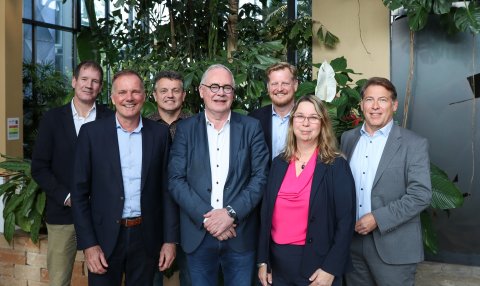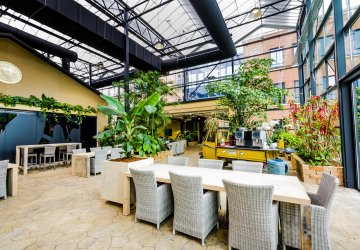
The “post-pandemic” world is coming closer with every vaccination - and organizations are already seeing new trends in how people want to work. As an employer, how do you manage workspace occupancy when your people wish to work from home more often? What do you do with the resulting free space in your office building when fewer employees will be present at any given time?
In 2018, no one predicted that in just three years roughly 25% of employees would want to work from home. But, according to TNO research, that is exactly what has happened, and organizations are facing a dilemma. Do you move to a smaller office with lower overheads? Or do you reorganize your available space and convert the challenge of “empty” space into opportunities?
Work hard, play hard
In 2020, organizations were forced to ensure that their employees had access to all the IT solutions that facilitated working from home. If checking emails, meeting and “producing” are just as easy to do at home as at the office – with the added bonus of less commuting and increased freedom – why would your employee come back to the office? Organizations wanting to have their people present on site must ensure that the office offers additional value when compared to the home office.
In that situation, the extra space that is now available becomes vitally important. The office must grow into a place for inspiration, motivation and co-creation, a place which offers employees things that are not available at home. The post-pandemic office will be a kind of club house, that makes visiting the office worthwhile. At Planon, we asked employees to compile “mood boards” to design their new workplace. This resulted in our open and sustainable workspace – a steel and glass greenhouse – in which working together feels organic. And we built a beach bar, because we believe that the best ideas often emerge over Friday afternoon drinks.
Sustainable innovation does not need to be expensive
Cost is one of the factors that can deter organizations from sustainably redesigning their free spaces. Companies tend to think that a refurbishment involves new designer furniture and artwork. But, that may not be relevant or appropriate for what you are trying to achieve at your business – and it certainly is not the norm. When Planon redesigned its office in 2020 and built a greenhouse as the central meeting point, this was less costly than other forms of new build, and the furniture we chose – garden lounge sets – were very appropriate and fun for the space and less expensive than designer furniture that would have served no additional purpose. Now, the seating in our greenhouse is much more comfortable and very inviting.
Google and Facebook preceded you
It is naturally quite a bold move for organizations to transform their “cubicles” into inspiration areas or to replace two meeting rooms with a gym. However, they should be encouraged by the numerous businesses who long ago converted their offices into a venue where their people want to be, rather than a place they must be.
In December 2020, Google announced that from September 2021, employees were only expected at the office three times a week, and that those offices would look quite different after September. That message comes from a company that has been building more “chill places” than closed workspaces and has installed slides near the stairs in most of its offices. In 2018, Facebook built a new head office that would feel like a holiday park, where the boundary between the garden and the office building cannot be seen or felt. Some of these transformations are extravagant and may not fit the mission and type of work of every organization, but Google, Facebook and other tech giants did tap into something valuable – they realized that a pleasant workplace with space for the individual creates a better work experience. And an enjoyable working environment will ensure that you retain employees and inspire them to bring on better results. And that is the thought process that we can all learn from as we tackle new ways of working now and beyond.





















